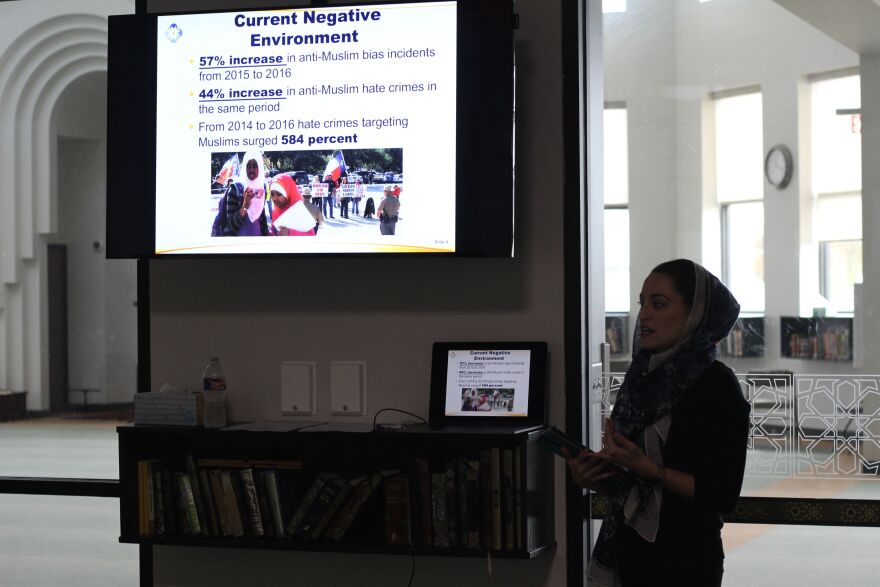Seventh-grader Zahir Hameed says many students don’t have a problem with him. But there’s one kid who calls him names.
“He just calls me 'stupid' and 'idiot,' and he just acts like I’m about to bomb the place,” said Zahir, on a recent Saturday morning at the East Plano Islamic Center.
The Wylie student is one of many Muslim kids here who shared their stories about bullying.
Local Muslim community leaders say bullying is becoming a growing problem for Muslim youth. So they’re helping them learn how to best respond to taunting and name-calling, as well as attacks on social media.
Another student said it happens a lot at his school.
“It’s just like when we’re randomly in the halls and someone will just start yelling 'Allahu Akbar' and, I mean, it’s not directed towards you, but it does happen. Like this is something we’re all used to.”
Allahu Akbar, which translates to "God is greatest," are words used during prayer. When these Muslim youths hear other students yell them out in school, they said it feels like they’re being made fun of.
One out of every two Muslim teens has been bullied, according to a CAIR survey in California.
Fighting misinformation
Ishaq Pathan led the daylong anti-bullying workshop. He asked students to be open and honest about their experiences.
“I think one thing that we’re really trying to do here is to encourage these kids to speak up for themselves and move from being targets to being empowered teens who are actively working to combat Islamophobia,” Pathan said.
Pathan is with Islamic Networks Groups, or ING, which teamed up with the Dallas-Fort Worth chapter of the Council on American Islamic Relations to host the event.
Pathan said bullying is a serious problem. According to a survey in California by the Council on American Islamic Relations, one out of every two Muslim teens has been bullied. That’s why he and his colleagues have been traveling around the country to lead these workshops.

Pathan said kids who go through this training leave armed with tools they can use whenever they’re bullied or hear misinformation about Muslims.
“They can then…raise their hand in class and say, ‘Actually, what you just said wasn’t correct,’" he said. "'Here it is from my perspective and from the perspective of the majority of Muslims, and if you want, I can actually give a short presentation on the history of American Muslims.’”
Disarming the bully
Pathan was a victim of bullying when he was a kid, so he gets it. He said some incidents aren’t done out of malice but rather ignorance.
He told to the students at the workshop there are four types of bullying: physical, verbal, indirect like rumors and cyber.
Then, he asked students, “What would you do if you were teased or bullied?”

One kids answered "nothing” because he said most kids who are bullied don’t do anything. Another kid said he’d call an attorney. And yet another student said she’d bully the person who was bullying her.
Pathan showed a photo of a female college student who was bullied on social media because of her facial hair and how she was dressed. She’s a baptized Sikh and because of her religion, she didn’t believe in changing her appearance.
"Encourage these kids to speak up for themselves and move from being targets to being empowered teens who are actively working to combat Islamophobia."
“What does this person do in her response?” Pathan asked.
“She explained why and she acted like she wasn’t affected by the mean comments that people made about her appearance,” said 10-year-old Hamsa Mohammed.
Hamsa said the college student handled the situation correctly by explaining why she was focused on her character, not her appearance.
“I think she kind of took away the power of the person who posted this picture because bullying is basically, like, giving power to the person who is bullying,” she said. “So, if you take away that power, then there’s no more bullying.”
“She took away that power. I love what you said there,” Pathan told Hamsa. “She took that power back.”
Nikiya Natale, an attorney for the Council on American Islamic Relations in Dallas, said her group plans to launch an anti-Muslim bullying campaign – one that will include not just students, but parents and teachers, too.
“It’s something that really is underreported. It is grossly underreported,” Natale said. “We do get requests for assistance and incident reports about bullying in the classroom, but it’s not as many as it should be.”
Perhaps with these kind of workshops, that will change, she said. After their lessons in person, students are expected to keep the conversation going and continue the lessons online. Eventually, they’ll get certified to teach the anti-bullying workshop to other students.









